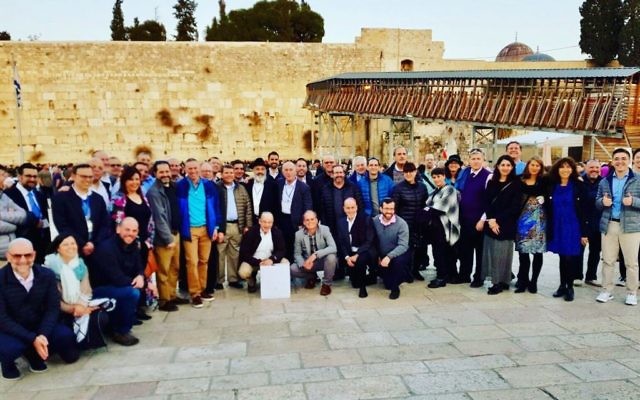Kirtz: Atlanta Explores Israel’s Security Options
The opportunities exist for the Jewish state to deepen connections with its Muslim neighbors.
Something very different is happening on the ground in Israel and the territories, Israeli defense correspondent Alon Ben-David explained to the 70 of us on the Federation-sponsored leadership trip to Israel.
Since Rosh Hashanah 2015, 440 terrorists have attacked Israelis, mostly with knives and cars, and 230 of them have been apprehended. All came from stories of personal distress or as a response to a recent prosaic event in their lives.
They have been made to feel like failures. All count on getting killed when they attack. They often think their lives will have a purpose if they can go out as heroes and get pensions for their families.
Many watch the Internet and see what Israel is “doing” — these are ultraviolent materials, such as snuff films produced by Islamic State, which excite some people.
There is no religious motive for these terrorists. They are mostly middle class. They live on their smartphones.
They don’t respect authority, whether it is their parents or the terrorist organizations themselves. They often will say they did not act in the name of any terrorist organization and do not want the organizations to take credit for what they did.
Young Palestinians are watching Israeli society and like the discourse about individual rights and other aspects of Israel. Israeli soldiers at the checkpoints are seeing a response from younger Palestinians, who challenge the soldiers and authority figures. They ask: “Who are you to ask me questions? Are you threatening me?”
This kind of discourse in the West Bank results in this: “I am done with you. I will eventually vote you out.” It is creating a disturbing reality on the ground.
On the other hand, Hamas has not launched a single bullet from Gaza in 41 months. It has lost its appetite to fight Israel. It is preparing for another war, but not to be fought at this time.
Hamas is a genuine creation of Gaza, and to think that the people there do not support it is wrong.
For now, Israel is stuck with Gaza. Egypt is not happy with Gaza and is destroying tunnels on its border with Gaza — 1,800 in a 9-mile stretch. One result of the distress in Gaza is that Israel is occasionally seeing Gaza kids crossing into Israel to get arrested and get three meals a day.
Apparently, the Gaza authorities have said to Israel, “Give us a seaport, and we will sign a long-term cease-fire.” Israel is considering the offer.
Israel would build and man the seaport on an island off the Gaza coast. The goods, presumably from Europe and other countries, would be carried by Israel partway on a causeway from the seaport to the Gaza Strip, then met by Gaza trucks to take goods to the Gazan people.
This is one opportunity to separate Gaza and the West Bank: They are becoming two different populations.
While Hamas is not in the mood to fight Israel, it does want to stay in power. This seaport may give Hamas a reason to moderate its mood toward Israel even more.
Ben-David believes that Israeli politicians need to re-evaluate Israel’s position in the region. They should stop being afraid to take advantage of opportunities and to deepen the country’s roots in the region.
He thinks U.S. support and help could make a difference. If President Donald Trump would show the parties what direction to go, even as just a signal, opportunities for greater regional cooperation might be created.
While peace has been taken out of the language in recent years, Israel needs to secure its future, not necessarily make friends.
Ben-David sees a good side to U.S. action. Nikki Haley has spoken to Israeli sentiment.
He thinks that Mahmoud Abbas sincerely rejects violence. Israel has to listen to his tough talk. Israelis do not have to make him a friend, but they need him to bridge differences.
It is not fair to place Israel’s young people in the perpetual position of judging others. Some progress in the conflict needs to be made, and Ben-David seems to think progress is possible.
Ben-David’s comments highlight the need of Israeli politicians to take advantage of opportunities and to help change minds in the region.




comments